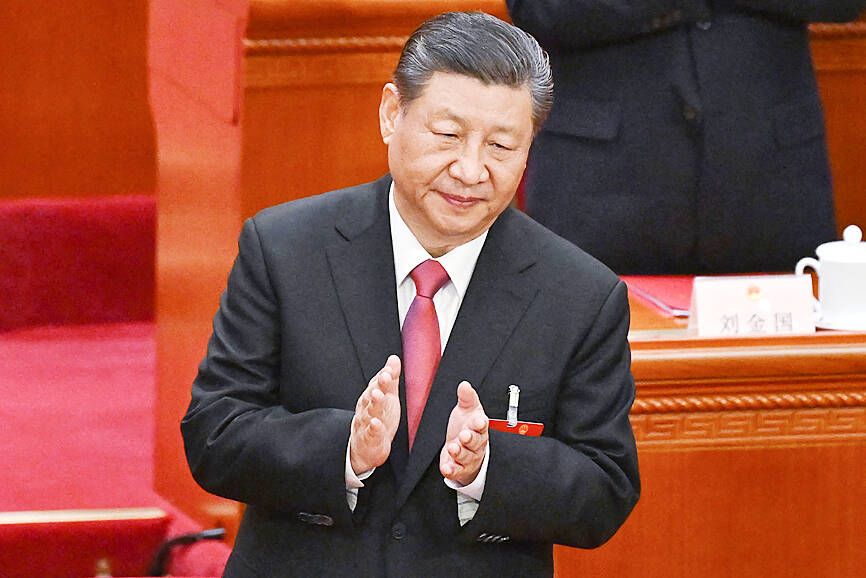China’s leaders yesterday wrapped up a week-long key conclave at which they admitted more was needed to revive a sluggish economy battered by an ailing housing market, poor domestic demand and record-high youth unemployment.
Top officials have been upfront about the myriad challenges China is facing, admitting that a modest 5 percent growth goal would not be easy and that “hidden risks” are dragging the economy down, but they have supplied few details about how they plan to tackle the problems.
Officials have also moved to strengthen powers to deal with threats to their rule and tightened a veil of secrecy around policymaking, scrapping a traditional annual news conference and vowing to include national security provisions in a raft of new laws.

Photo: AFP
Delegates to the National People’s Congress, including Chinese President Xi Jinping (習近平), gathered at Beijing’s Great Hall of the People to rubber-stamp legislation at 3pm as the conclave came to an end.
Among the pieces of legislation approved was a revision to the Organic Law of the State Council, China’s Cabinet, which state media has said would aim to deepen the “leadership” of the Chinese Communist Party over the government.
Delegates also approved the nation’s state budget, and the national economic and social development plan for this year. Only a handful of the body’s almost 3,000 delegates voted against any of the motions.
The tightly choreographed event capped a week of high-level meetings that have been dominated by the economy, which last year posted some of its slowest growth in years.
Ministers on Saturday pledged to do more to boost employment and stabilize the nation’s troubled property market.
“Workers face some challenges and problems in employment, and more effort needs to be made to stabilize employment,” Chinese Minister of Human Resources and Social Security Wang Xiaoping (王曉萍) told a news conference.
Chinese Minister of Housing and Urban-Rural Development Ni Hong (倪虹) said that fixing the property market — which long accounted for about one-quarter of China’s economy — remained “very difficult.”
Despite official pledges of fresh support, analysts say they are yet to see the kinds of big-ticket bailouts the flagging economy needs if it is to rebound.

CHAOS: Iranians took to the streets playing celebratory music after reports of Khamenei’s death on Saturday, while mourners also gathered in Tehran yesterday Iranian Supreme Leader Ayatollah Ali Khamenei was killed in a major attack on Iran launched by Israel and the US, throwing the future of the Islamic republic into doubt and raising the risk of regional instability. Iranian state television and the state-run IRNA news agency announced the 86-year-old’s death early yesterday. US President Donald Trump said it gave Iranians their “greatest chance” to “take back” their country. The announcements came after a joint US and Israeli aerial bombardment that targeted Iranian military and governmental sites. Trump said the “heavy and pinpoint bombing” would continue through the week or as long

TRUST: The KMT said it respected the US’ timing and considerations, and hoped it would continue to honor its commitments to helping Taiwan bolster its defenses and deterrence US President Donald Trump is delaying a multibillion-dollar arms sale to Taiwan to ensure his visit to Beijing is successful, a New York Times report said. The weapons sales package has stalled in the US Department of State, the report said, citing US officials it did not identify. The White House has told agencies not to push forward ahead of Trump’s meeting with Chinese President Xi Jinping (習近平), it said. The two last month held a phone call to discuss trade and geopolitical flashpoints ahead of the summit. Xi raised the Taiwan issue and urged the US to handle arms sales to

State-run CPC Corp, Taiwan (CPC, 台灣中油) yesterday said that it had confirmed on Saturday night with its liquefied natural gas (LNG) and crude oil suppliers that shipments are proceeding as scheduled and that domestic supplies remain unaffected. The CPC yesterday announced the gasoline and diesel prices will rise by NT$0.2 and NT$0.4 per liter, respectively, starting Monday, citing Middle East tensions and blizzards in the eastern United States. CPC also iterated it has been reducing the proportion of crude oil imports from the Middle East and diversifying its supply sources in the past few years in response to geopolitical risks, expanding

Pro-democracy media tycoon Jimmy Lai’s (黎智英) fraud conviction and prison sentence were yesterday overturned by a Hong Kong court, in a surprise legal decision that comes soon after Lai was jailed for 20 years on a separate national security charge. Judges Jeremy Poon (潘兆初), Anthea Pang (彭寶琴) and Derek Pang (彭偉昌) said in the judgement that they allowed the appeal from Lai, and another defendant in the case, to proceed, as a lower court judge had “erred.” “The Court of Appeal gave them leave to appeal against their conviction, allowed their appeals, quashed the convictions and set aside the sentences,” the judges